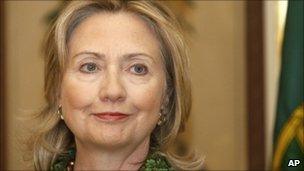Wikileaks: National security or national embarrassment?
- Published

The leaks of American diplomatic communications are certainly revealing and occasionally startling - but are they damaging?
Do they threaten US national security or are they simply a US national embarrassment?
One test is to see if the cables show a secret diplomacy that is at serious odds with the public.
Here, the case of Iran is important. What the documents show in fact is not that the US secretly wants to go to war with Iran but that it has resisted pressure to do so from Israel and Arab leaders acting out of a coincidental common interest.
This is very much in line with President Barack Obama's public diplomacy, which is to engage with Iran and, if necessary, to impose sanctions to try to get it to stop its nuclear activities. This it has done and the documents agree.
The damage in this case is that the US has not protected the Gulf Arab leaders from having their opinion that Iran should be attacked made public. Yet for the rest of the world this is actually very important information. It might even give Iran pause for reflection.
Missions uncovered
On the evidence so far there is really only one secret operation that appears to have been blown. That is an effort by US diplomats at the UN to get personal details (passwords and even frequent flyer numbers) about senior UN staff and permanent representatives on the Security Council.
That indeed might come as something of a shock to the British ambassador there. He might have felt that his country's claimed "special relationship" with the US protected him. Not so, it appears.
Another revealed operation in fact sounds rather worthy. This is an attempt to secure nuclear material in Pakistan to prevent it from being potentially smuggled to terrorists. However, we also learn that Pakistan has resisted the plan on the grounds that it would lead to it being criticised for being too pro-American. So Pakistan knew and it therefore seems that no secret operation has been compromised.
For the rest, there is the usual and expected personal and political tittle-tattle that gives more than a glimpse of the day-to-day work of diplomacy whose honeyed public words normally seek to hide the acidity of real opinions.
Everybody in the business knows this goes on and if they are shocked they have no business being in diplomacy.
The only unusual thing is that this kind of stuff has been made public now instead of everyone having to wait years before the cables are formally released. Putin as an "alpha-dog"? Sarkozy as the "emperor with no clothes"? Embarrassing? Maybe. Damaging? Hardly.
Public airing
Mr Putin might revel in his description. The Americans call him Batman as well. Even better.
One cable is said to reveal highly critical American assessments of British military operations in Sangin in Afghanistan.
But the British military has been criticised by others anyway, including bereaved relatives at home, so this is not a bolt from the blue.
Allies fighting a war together always argue over tactics and blame each other over performance. A public airing of the debate might lead to better operations. World War II was rife with rivalry between American and British generals. Why should Afghanistan be any different?
Some of the documents simply show the forward planning that diplomacy has to engage in. There have been discussions between the US and South Korea, for example, about what to do if North Korea collapses.
One should hope so. China, it is said, might be assuaged about a united Korea with commercial incentives. Sensible, many might think.
No doubt new systems will be evolved to protect diplomatic traffic better. Diplomats and governments will always want as much secrecy as they can get or get away with.
They will always cry havoc if their reports are revealed. My experience is that leaks rarely lead to any lasting damage and often have beneficial effects.
A 100 years ago, governments could still sign treaties with secret clauses. That era at least has gone. Maybe this dump of information will lead to a realisation that secrecy is not always best, though I doubt it.
paul.reynolds-INTERNET@bbc.co.uk
- Published28 November 2010